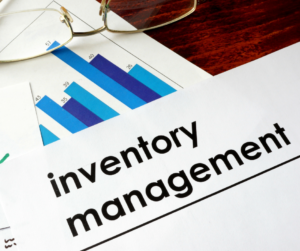![]()

Take a moment and think of a few successful retail businesses. These businesses could be huge corporate organizations or flourishing small businesses. The size of the operation is not important, just the fact that they are successful. Now ask yourself these questions:
“What do these companies have in common?”
“Do they always have the products you want readily in stock and available?”
“Are their customer satisfaction reviews consistently positive?”
Chances are, that these retail businesses maintain such a great reputation and a successful business model because they are dedicated to their inventory management and reporting. In the retail sector, inventory management, although sometimes daunting, is extremely important to the company’s success. As we look at what can make or break a retailer, accurate inventory management is an immense factor.
What is Inventory Management?
When running a retail chain, store, or organization, a supply chain function is in place to maintain the supply and demand of your customers. Inventory management is part of the supply chain function, controlling and overseeing purchases from your customers as well as your suppliers. This includes the storage of your stock, product for sale, and order fulfillment. Inventory management assists companies by identifying what and how much product and stock to order at any given time. The process will track the product from point of acquisition all the way to the sale. Through inventory management, companies can identify purchasing trends making sure you never run out of the stock that your clients desire to find on your shelves.
At the time the product sells, it transforms into store revenue. Prior to sale, inventory is an asset that can tie up cash. Because of this, if you acquire too much stock, it will cost you money and reduce your overall cash flow. Implementing inventory management processes within supply chain eliminates this issue. Finding the balance between having products available without too much stock is a key part of retail success, and inventory management is what helps you achieve that.
Benefits of Inventory Management

All public companies are required to track inventory for compliance with the Securities and Exchange Commission (SEC). Reporting accurate inventory numbers will ensure your compliance while also assisting your growth. Not to mention, best practices within business structure and as a tool to improve business strategies when it comes to supply and demand.
There are countless benefits to knowing what comes in and goes out of your store, but the biggest benefit is the ROI and profitability. Understanding the stock trends reduces loss and waste and therefore, increases profits. It also plays a critical role in your customer satisfaction, by ensuring that products that are in demand are there and ready for sale. Some other key benefits of strong inventory management include, but are not limited to:
- Accurate look at your inventory
- Reduce the risk of overselling a product
- Managing out of stock items, avoiding excess stock
- Better insights within your overall functionality
- Creating better terms with suppliers and/or vendors
- Greater productivity
- Organization
Challenges with Inventory Management
Just like any process established within running a business, there are challenges and obstacles that need to be addressed and resolved. With Inventory management, implementing sound and consistent practices will reduce the chances of error and avoid challenges, but being aware of these possibilities will help you to get ahead of the game. Some common challenges with accurate inventory management include:
- Inconsistent tracking of product
- Warehouse organization
- Inaccurate counts and data
- Changing supply and demand
- Manual documentation – room for human error
- Inadequate order management
- Lack of production planning
- Lack of skilled inventory managers
- Inefficient communication
- Absence of inventory software or technology
When conducting your inventory, these are the issues that you want to avoid. By implementing consistent practices, eliminating chances of human error, hiring knowledgeable and skilled individuals to perform your counting, and investing in technology and software that will assist in accurate reporting, you can reduce loss and create visibility of what is happening with the products within your store and/or warehouse.
Ways We Count

There are several ways to get accurate information when counting your inventory to contribute to your overall inventory management. Deciding which type of reporting is needed will help determine which way you should count your store. Here are the practices Quantum Services provides for our C-Store customers:
- Financial Audits: Financial audits calculate the total retail value of all products available for sale. It is broken down by department or category as well as geographic location within the store.
- Hybrid Audits: Hybrid audits provide more options and combine the benefits of scan audits at a lower cost. There are 3 types:
- Financial audit with price book accuracy (FAPA) allowing pricing verification via scan.
- Financial audit with item-level features (FIL) offering pricing integrity without item-level detail.
- Combination audit (COMBO) combines a scan with a financial audit.
- Item Level Scan Audits: Item level scan audits scan the barcode (SKU) for each product and enter the quantity. For ILSA audits to be reconciled, comparisons are made for each item with the book the store has “on hand.” This method requires a mindset shift from retail and category management to a more detailed item-level management.
Tools to Assist with Inventory Management
Inventory counting and management can be a tedious task and can leave a lot of room for human error if not done properly. There is a vast variety of software and technology that can be implemented within your retail system to assist in counting and reporting. Additionally, replenishing software is available to streamline the ordering process and ensure inventory supply through automated ordering. These investments can save money by cutting down on paid hours it may take to complete these tasks and free up the employee to focus on other needs within the business. There are additionally, companies that you can outsource your inventory auditing needs to ensure accuracy, alleviate loss, and increase profits. At Quantum Services, we specialize in C-Store inventory auditing and work closely with our C-Store clients to improve their stores, reduce their loss, and boost their profits – all while taking the stress out of counting inventory. Reviewing your business’s inventory management practices and investing in ways to control your inventory will help you to become one of the successful retail stores that come to mind when someone else is looking for a model to build their business.